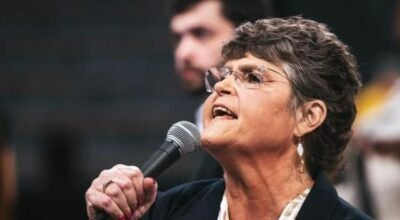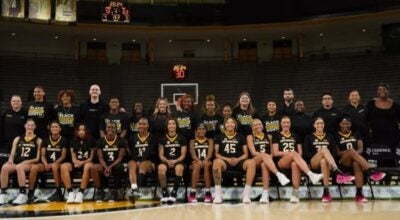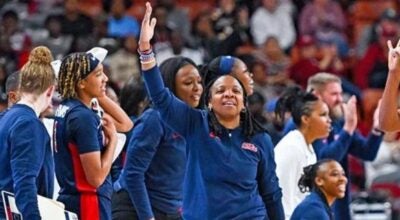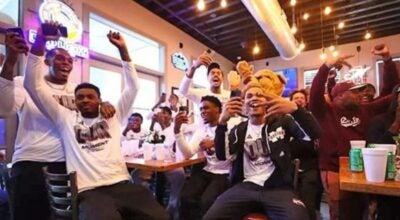Ten years ago, the Ole Miss Landshark was born—along with Tony Fein’s lasting legacy
Published 2:15 pm Monday, February 12, 2018

Read the story of Tony Fein, including exclusive photos, in the February 2018 issue of Oxford Magazine.
One hot afternoon in the summer of 2008, Tony Fein was bringing all he had to the Ole Miss practice field. It was a culmination of many emotions, but most notably determination. Fein, a 26-year old college junior having returned from military deployment, was upset with his amount of playing time the year before and his standing for the upcoming year. He felt he had earned more respect on the football field.
Fein landed a couple of sacks on the Rebels’ quarterback at the time, Jevan Snead, and the defense got fired up. His teammates and close friends on defense, once-in-a-decade greats such as Jerrell Powe, Kentrell Lockett, Peria Jerry and Ashlee Palmer, rallied behind Fein and watched as No. 47 threw his hand over his head and made a gesture entirely too familiar to Ole Miss fans now. It was a manifestation of continued frustration combined with the thrill of the game he loved, and it came to life as a symbol of excellence and a rallying cry.
At the time, it was odd, almost comical, and sitting defensive coordinator, Tyrone Nix, remembers the general thought process among players and coaches: “What the hell was that?” But Fein didn’t mind the mockery that accompanied his gesture early on because he was the Landshark, and he was dead-set on proving it.

Fein, a Rebel from 2008-09, passed away in late 2009, less than a year after he first introduced Ole Miss to the Landshark. A drug overdose, on paper, a foreshadowing of an opioid epidemic marring the better part of a decade, and a far-too-common ending for military veterans and former football players alike. Fein, being both, faded from stardom at Ole Miss as the football program experienced new highs and lows in the soon-to-be ten years since Fein’s death.
When the Landshark began to gain momentum and spread beyond the football field, Fein often had to convince friends that it was indeed he who first brought the gesture to Ole Miss. He didn’t mind it, according to his brother Richard; he thought the whole thing was funny.
The Landshark movement, that he just happened to create, had taken over the University of Mississippi, and he loved it. He had begun a tradition, and in a short life that spanned from the Army to professional football, he was always able to cling to his product, the Landshark.
—
The two-way player out of Port Orchard, Washington, had a different path than most from the high school field to the SEC. At the age of 19, he enlisted in the Army and served as a Delta Reconnaissance Scout, spending a year on the front lines in Iraq as a part of his nearly four-year service with the Army. It was overseas where the Landshark first entered Fein’s life, as his unit was rightfully nicknamed “the landsharks,” according to his former NFL agent and friend, Milton “Dee” Hobbs.
Fein never knew his birth father, but when Donnell Daniels, a retired Navy veteran, married into the family, Fein knew he had a person to call “Dad.” It was Daniels who pushed Fein towards a life of service, and who led the high school graduate to pursue the Army before continuing his football career.
“Anthony’s dad was not in the picture,” Richard said. “Never seen, never heard from, and Anthony never knew who his dad was. His entire life, he never knew who his biological father was. There were questions sometimes, but he never sought out a name or tried to find him. That was out of his mind after those teen years. I don’t think that was an issue for him, and our dad was plenty of dad. He was ‘Pops.’”
Like many who’ve experienced combat firsthand, Fein was notoriously reserved about his years in Iraq, even to close friends and family.
“He didn’t talk about it a whole lot with me,” Hobbs said. “He was a front-of-the-lines type guy and he’s had friends that he lost, he got pretty up-close with that type of combat. He didn’t talk a whole lot about it.”
Regardless, Fein’s plan from the beginning was to re-establish himself as a football player after returning to the States, but he knew he had a difficult path in front of him.
“He kind of fell out of recruiting fervor, if you will, just because he was a little older and devalued almost by the higher programs, so he ended up in Scottsdale,” Hobbs said.
Fein landed first at Scottsdale (Ariz.) Community College, where he built himself into one of the nation’s top linebacker recruits, and where he popped up on Rebels’ head coach Ed Orgeron’s radar.
The SEC was always a dream landing-spot for Fein, who had grown up with Richard embroiled in the world of an SEC-dominant college football, and Ole Miss was an ideal home him.
“He knew about Eli Manning and Deuce McAllister, and we’d watched SEC Football a lot growing up,” Richard said. “At that time, he wanted to play in the SEC because they’d had all those high profile names come through, and he wanted to play with what he felt was the best, which he thought he was.”
The veteran was never alone in his journey from Washington to Ole Miss and beyond though, as his brother Richard was with him every step of the way.
It was always “us” for the Fein brothers, never a one-man game. Richard, Anthony’s junior by two years, followed his older brother first to Scottsdale, then to Oxford, and stuck with him through his ventures across the NFL. They were attached at the hip, and family was everything for the duo.
“That was my best friend,” Richard said. “I was his best friend. If we had a question, or a worry, we always went to each other. Growing up, we shared a bedroom until we were into our teens, and even in Scottsdale, we lived in a one-bedroom apartment together. We were always on top of each other. That was my best friend, that was my boy.”
Tony, and subsequently, Richard, enrolled at Ole Miss just in time to see out Orgeron in his final year of coaching the Rebels in 2007.
“I still remember the first time Tony came on a recruiting visit, and I remember thinking, ‘Look at this guy,’ and then when he told us how old he was, we were wondering what he could actually help us with,” Lockett said. “He talked the talk, and we were curious to see if he could walk the walk too, and as soon as practice started, we realized what we had in Tony.”
Fein first stepped on to the field at Ole Miss as a 26-year old seasoned veteran playing side-by-side with his 19 and 20-year-old counterparts.
“He was a little older than all the fellas around at the time, and he was looked up to, especially being an Army veteran and having life experience,” Richard said. “I do feel like he rubbed off on the team and the players, and helped change the atmosphere.”
He immediately made an impact on the field as well, and helped oversee the Rebels’ transformation from a three-win team in 2007, to a nine-win, Cotton Bowl champion Rebel team in 2008.
“He modeled his play after Lawrence Taylor, and he was that vicious with it every play,” Lockett said. “He was going to make the play, because he was going to blow up the guard in front of him, the tackle in front of him, the fullback in front of him, and the quarterback too. That was Tony Fein. There were no mistakes with Tony. If you were to miss a play, Tony would put you in the right spot. If you missed a tackle, Tony would be in your ear yelling.”
Though Fein’s level of competition was unmatched, at least according to Lockett, his years off from the game were evident, and he saw his playing time dip below where he would have liked it to be.
“The thing about Tony, he had a high opinion of himself,” Nix said. “Tony came by my office every morning to see where he was on the depth chart, and if he wasn’t number one, he would be like ‘Coach, man, tell me what’s going on.’ Tony had a true passion for the game and getting to the ball, and that’s one thing you couldn’t take from him. He wanted to be the next Patrick Willis.”
It was then, right before the defense made strides to put Ole Miss on the national radar in the 2008 season, that the Landshark first made its appearance above Fein’s head and in an actual game.
“He was in practice one day, and he didn’t feel like he was getting his dues,” Richard said. “He thought he was the best linebacker on the team, and I agree. We both felt that he should have been getting more playing time and starting more, so in practice, they were doing their live drills and he was blowing up the seam. He was killing it in practice, and said something to the effect of ‘I’m here.’ He was smelling blood in the water, and he was the Landshark.”
That year, the Landshark became a rallying cry among the team en route to the Rebels’ year of national prominence, including wins at Florida and LSU.
“You had to reach Tony’s competition level on the field in order to throw up the Landshark,” Lockett said. “The reward for making a big play, the light at the end of the tunnel, if you will, was throwing up the Landshark. It turned into more, of, like I said, the ultimate celebration. It was like Miami throwing up the ‘U,’ or Oregon throwing up the ‘O.’”
In its infancy, the Landshark was a form of communication among Fein’s friends on defense, and a way to celebrate a game-changing play. The gesture grew, however, and as the t-shirts and media frenzy commemorated the Landshark, the “Fins Up” mantra swept through the Ole Miss Athletics Department.
“The Landshark just grew so much,” Nix said. “I remember one time in its early years, I looked back at church one day and my daughter was doing the fins up, and she just said ‘Daddy, the sharks are coming into church.’ We would laugh.”

As the Landshark continued to grow and transcend football, Fein knew his legacy at Ole Miss was intact, and he set out to pursue his lifelong goal of playing in the NFL. He finished his Rebel career with 136 tackles in 24 games and signed with Hobbs in hopes of making the league.
“We would sneak upstairs late at night and work on cut-ups of his highlights,” Hobbs said. “We would take whatever we could get from Ole Miss, whether it be practice tape or game highlights, and we made a compilation of his best plays to send out to NFL scouts. He was so invested in it, and excited about it, and I consider myself a pretty good scout or I wouldn’t have been doing what I was doing, but he still wanted to be in there while we were making his tape and pick out his own plays and tell us where to put them in order. I’ve never seen anyone that involved in their own cut-up, but he was.”
Around draft season in early 2009, Hobbs fielded calls from the Seahawks, Cowboys, and Ravens, and he hoped to hear Fein’s name come off the board in the draft in the late rounds. It never did, but Fein was still sought-after talent, and he signed with Seattle as a priority free agent. That summer, Fein survived a couple rounds of cuts, but didn’t make it on to Seattle’s final roster. He turned to Baltimore, who signed the former Rebel in hopes of finding a budding star.
Fein truly loved his offseason in Baltimore, where was able to train under his once-idolized favorite NFL player, linebacker Ray Lewis, but the Ravens were simply too deep at the linebacker position to keep Fein, and he had to endure yet another heartbreaking cut.
“He was crushed,” Richard said. “He came home, and to be going from ‘Tony Fein,’ big All-American Junior College player, SEC linebacker, to going home and crashing at his mom’s house, he was hurt, depressed, and sad. A lot of the other fellas made it, and the thought process was a lot of ‘Why not me?’ after all the work and time he put in.”
Fein was out of the league, at least briefly, but football was how the young man planned on taking care of his family, and there was no backup plan, so he continued to work and train while hoping for good news from Hobbs.
“There was no plan B,” Richard said. “There was no ‘What if I don’t make it?’ We just didn’t think that was an option. Why would everything work out so well according to the plan, for it not to work out in the end?”
His work ultimately seemed to pay off, and a little help from injuries at the Ravens’ linebacker position midseason opened up a spot for Fein. Hobbs received the call inviting Fein back to Baltimore early on Oct. 6, but Hobbs had shocking news for the Ravens.
—
After his initial release from Baltimore, Fein was demoralized. He returned home to Washington, back to his family and his waiting brother. Tony and Richard talked it over on the phone, and the older brother went out for a night to forget his struggles with the league.
“He called me, said he was getting out of the house and going over to Calvin’s house, kick it, and I just said ‘Have fun,’ and that was the night he went over there,” Richard said. “We had a regular conversation, you know, roast each other a little bit, joke a little bit, say ‘I love you,’ and that was the end of our conversation.”
He was never much of a drinker, at least according to Hobbs, but that night Fein accidentally combined prescription medication with alcohol.
“He went out on the town with some friends, and he was drinking, and he was not a big drinker,” Hobbs said. “His alcohol tolerance was almost nothing, and he had taken some pills that he had gotten his hands on. He laid down after the night, threw up in his sleep, asphyxiated, and died… It’s a shitty way to go out.”
Fein collapsed Oct. 6, just hours before his lifelong dream of playing in the NFL had become a reality, and died at Harrison Medical Center in Bremerton, Wash. The coroner ruled his death an accidental drug overdose, and the toxicology report showed “acute opiate [morphine] intoxication.”
“Mom was in Maryland. I got a call from her at about 10:30 a.m., and she didn’t sound good,” Richard said. “She said ‘Rich, you need to get home as soon as you can. Your brother’s dead.’ And I felt my heart break. It was hard to swallow, man. I don’t know. It was hard for us to believe that Anthony was gone. Really hard.”
Perhaps the pain of yet another roster cut or the years of physicality on both the football field and the battlefield might have forewarned the tragedy. To friends and family, however, it was nothing more than a “freak accident,” a terrible calamity that struck without warning.
“It was rough, and I hung it up as an agent after that,” Hobbs said. “Now I’m just a boring lawyer behind my desk in Oxford.”
For Fein, football was his passion, but family was his life, and after his death, his family took immense pride in knowing that his time spent off the field was just as revered as his time on it for the people important in his life.
“Even though he was a big, tough linebacker and Army veteran, he had a lot of love,” Richard said. “He loved his family, extremely loyal to his friends, everyone who he grew up with. He was just a very caring, loving, gorilla-type dude. He taught me a lot about life, and loyalty, and true friendship. There aren’t too many people in the world that care a lot about you, so the ones that do, keep them close.”
After four years in the Army, two in Junior College, two more at Ole Miss, and a brief stint around the NFL, Fein’s days were over, but his legacy was far from diminished.
The Landshark became Ole Miss’s official mascot in 2017, after a student-led ballot initiative replaced the black bear. By then, its prominence had grown to encapsulate the success of all Rebel athletes, not just Fein, but those that were around to see the creation of the Landshark always take pride in knowing that they were a part of school history.
“I think Tony Fein will go down in school history as probably the third most prominent player to play besides Archie Manning and Chucky Mullins, history-wise,” Nix said. “He’s made an unbelievable impact on the Athletics Department at Ole Miss, and I was just blessed to be a part of it. I still take pride in knowing that I was a part of the creation of the Landshark.”
Photos provided by Ole Miss Athletics





